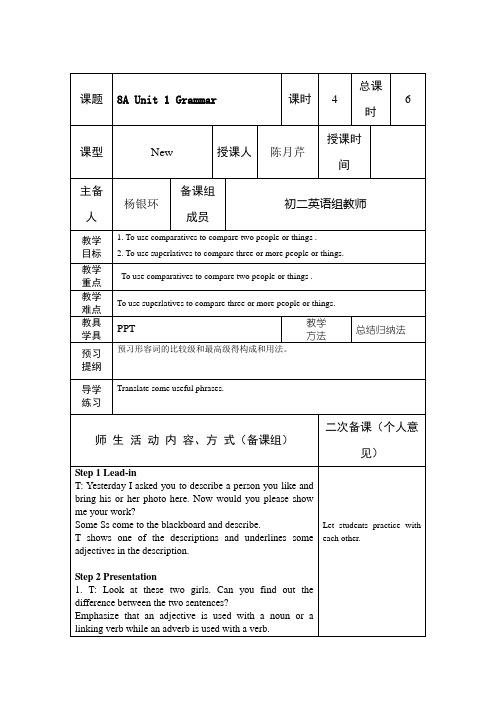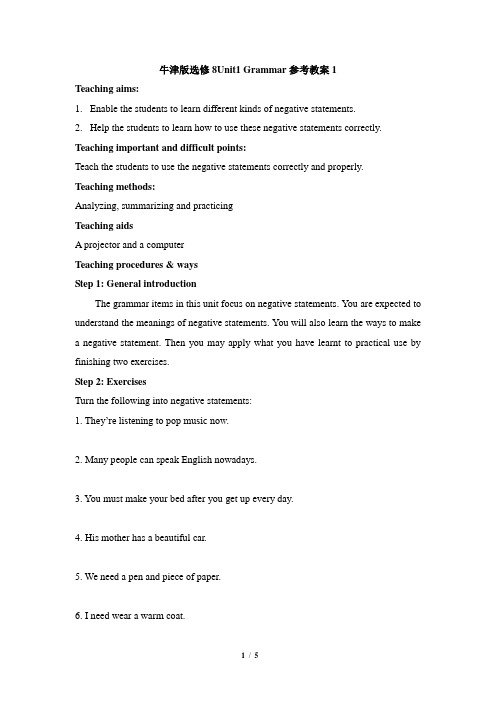BOOK8-Unit-1-Grammar[名词性从句]教学文案
- 格式:ppt
- 大小:400.00 KB
- 文档页数:15



选修八unit1语法Book8 Unit1语法导学案(A)名词性从句(I)---宾语从句和表语从句学习目标:知识目标:复习,领会、名词性从句的用法,本单元学习掌握宾语从句和表语从句。
能力目标:掌握名词性从句的相关概念、能解决名词性从句的问题。
情感目标:自主、合作、探究,激情展示,大胆质疑,分享成果。
激发学生对语法的学习热情。
学习重点:学习掌握宾语从句和表语从句;学习难点:掌握名词性从句中的时态、语序;if 与whether的用法区别;以及what与which ,who与whoever的区别。
第一部分:预习案概念:在复合句中起名词作用的从句叫名词性从句。
名词性从句的功能相当于名词词组,它在复合句中能担任主语、宾语、表语、同位语、介词宾语等, 因此根据它在句中不同的语法功能,名词从句又可分为主语从句、宾语从句、表语从句和同位语从句。
连词:that, whether, if, as if, as though引导词:连接代词:指人的who(ever), whom(ever) , whose;指物的which(ever),what(ever), whose连接副词:when, where, why, because, how等。
例句呈现:宾语从句1组. 1.We know (that) she did a good deed yesterday.2. Mary wrote an article on why the team had failed to win the game.3. I wonder if (whether) the news is true or not.2组. 1. We know (that) she studies English every day.2. We know (that) she studied English last term.3. We know (that) she will study English next year.4. We know (that) she has studied English since 2005.1. She said she enjoyed reading English novels.3组 2. She said the girl was doing some washing .3.She told me that she had never been there before.4. She told me that she would never forgive me.表语从句:4组 1.My suggestion is that we should go shopping.2. It seems that it is going to rain.3.It looks as if it’s going to rain.4.The reason why he was late was that he didn’t catch the early bus.观察以上各组例句,结合语法书,完成以下问题1) 宾语从句的句子结构:____________________________________________________________表语从句的句子结构:____________________________________________________________2)从句中的时态问题在名词性从句中,特别是宾语从句中要注意时态呼应问题,当主句动词是现在时,从句的时态_________________________________;当主句的时态是过去时,从句的时态________________ ____,客观事实除外。

感顿市安乐阳光实验学校第二中学英语选修8unit1《语法-名词性从句》教案【课标要求】1.掌握主从复合句中的宾语、主语、表语从句。
2.在语境中了解和掌握名词性从句的表意功能。
【预习案】1.名词:表示人或事物的名称的词叫名词。
2.名词在句子当中一般可以作什么成分The boy is li Ming.主语表语Mr. Liang , a 24-year-old boy, teaches us English .主语同位语宾语名词在句中主要作主语、宾语、表语和同位语。
名词性从句在功能上相当于名词语 His job is imp ortant.What he does is important.语 This is his job.This is what he does every day.语I don’t like his job.I don’t like what he does every day.语I don’t know about the man, Mr. White.I don’t know about the fact that he is a teacher.引导名词性从句词有:连接词作用whether 是否that (本身无词义) 只起连接词作用,引导从句,在从句中不作任何成分who, whom, whose which 哪一个what 什么,所…的在从句中作主语、宾语和定语在从句中作主语、宾语和定语在从句中作主语、宾语和定语when什么时候,where什么地方how怎样、怎么,why为什么除了起连接词作用外,还在从句中作状语不可省略的连词:1. 介词后的连词2. 引导主语从句和同位语从句的连词不可省略。
That she was chosen made us very happy.We heard the news that our team had won.名词性从句高考考查主要内容①引导词的选择与判断;②词序:不倒装(陈述语序);③时态:注意主,从句时态的呼应二次备课(教师)学习补充及疑惑(学生)判断以下句子是什么从句?1.Whoever comes is welcome.2.How we can help the twins will be discussed at the meeting.3. It has no t been decided yet when they’ll start the project.4. The question is who can complete the difficult task.5. The problem is how we can get there on time.6. I always think of how I can improve my spoken English.7. I wonder why she refused my invitation8. I suggest we (should) set off at once.9. The suggestion that the mayor (should) present the prizes was acceptedby everyone.【探究案】一、检查反馈,导入新课。


牛津版选修8Unit1 Grammar参考教案1Teaching aims:1.Enable the students to learn different kinds of negative statements.2.Help the students to learn how to use these negative statements correctly. Teaching important and difficult points:Teach the students to use the negative statements correctly and properly.Teaching methods:Analyzing, summarizing and practicingTeaching aidsA projector and a computerTeaching procedures & waysStep 1: General introductionThe grammar items in this unit focus on negative statements. You are expected to understand the meanings of negative statements. You will also learn the ways to make a negative statement. Then you may apply what you have learnt to practical use by finishing two exercises.Step 2: ExercisesTurn the following into negative statements:1. They’re listening to pop music now.________________________________2. Many people can speak English nowadays._________________________________3. You must make your bed after you get up every day._______________________________________________4. His mother has a beautiful car.________________________________________________5. We need a pen and piece of paper.________________________________________________6. I need wear a warm coat._________________________________________________7. The old man always goes for a walk in the park after supper._______________________________________________8. The doctors volunteer in the countryside every year._________________________________________9. Mike does sports in the afternoon.________________________________10. You’d better talk with your parents right now.___________________________________Keys:1. They aren’t listening to pop music now.2. Many people can’t speak English nowadays.3. You don’t have to make your bed after you get up every day.4. His mother doesn’t have a beautiful car.5. We don’t need a pen and piece of paper.6. I needn’t wear a warm coat.7. The old man seldom goes for a walk in the park after supper.8. The doctors don’t volunteer in the countryside every year.9. Mike doesn’t do sports in the afternoon.10. You’d better not talk with your parents right now.Step 3: Explanation and practice:1. Make a list of the most commonly used negative words:no, not, never, neither, hardly, seldom, f ew, little, barely…2. Please decide whether it is a true statement:John Keats was a famous short story writer.This statement is untrue.We can correct an untrue statement in the following way:John Keats was not a famous short story writer.3. As we learned, negative statements are often used to correct a mistaken idea. Let’s recall the ways to make negative statements.4. Read Part 1 and Part 2. When not is used with a negative prefix, the meaning of thesentence is positive. However, the positive meaning is not as strong as that of a direct positive statement. For example:Students are not discouraged to discuss things with their classmates. (Students are encouraged to discuss things with their classmates.)Your actions were not inexcusable, but they were certainly not appropriate. (Your actions were excusable, but certainly not appropriate.)It is not uncommon for him to be late. (It is very common for him to be late.)not can be used before a phrase of time, distance or a noun phrase to emphasize the negative meaning of the phrase. For example:It is not a long distance from the city center to the new railway station. (=It is very near from the city center to the new railway station.)It will not be long before most people around the world know how to use a computer. (=Soon, people around the world will know how to use a computer.) There were not many people present for the lecture. (=There were very few people present for the lecture.)5. Read Part 3. In informal English, the negative expressions can be used with whether and if to show doubt or uncertainty. For example:I wouldn't be surprised if they didn’t buy a house soon.(=I wouldn’t be surprised if they bought a house soon.)I wonder whether/if I shouldn't get a haircut. (=I wonder whether/if I should get a haircut.)I wonder whether/if I shouldn't buy a new suit. (=I wonder whether/if I should buy a new suit.)6. Read Part 4. Pay attention to some negative expressions.on no account, in no circumstances, never before, nowhere, at no time, by no means, 7. Read a book report written by Sharon. Try to cycle the negative statements. Answers:A 1 … he experiences an abnormal childhood without any parents.2 He is raised in a place with other children who also have no parents.3 He is then sent to a workhouse, where he has to work very hard and hardly hastime to relax.4 Oliver does not like anything about the workhouse.5 He is treated very badly and seldom has enough food or water.6 Fagin is not a good character and cares only about himself.7 Oliver does not know anything at first and stays with Fagin.8 He does not want to steal from anyone, but in order to survive, Oliver is forcedto become a criminal.9 Mr. Barnlow is a man without any of Fagin’s vices.10 Unless Oliver can escape, he will never be reunited with Mr. Barnlow.11 He will have only misfortune, not a real family and the love he deserves, which is the major theme of the book.8. Finish Part B individually.AnswersB 1 surprised if, didn’t2 not uncommon3 Not many4 wonder whether/if, shouldn’tStep 4 Language points1.serve(P8)verb [T] : 服务,接待to provide food or drinks: 提供食物,饮料等servicenoun [U] : 服务,接待2.raise (P9)verb [T] : 抚养;抬高, 提高; 举起3. abuse(9))verb [T] : 虐待4. get caught(P9)verb [L + past participle] getting, got, got or US gottensometimes used instead of 'be' to form the passive: 5.pressure(P9)pressverb [I or T;]: 按,压6.threat (P9)noun [C] : 威胁threaten[T] : 威胁Homework1.C1 & C2 in the workbook.2.Unit Revision: Period 5.。
8B unitl Grammar(1)一、 教学目标1、 识记动词的过去分 词形式。
2、 能够在语境中正确运用现在完成时。
二、 预习导学A ) 预习 GrammarA ,并完成 part A1 and A2B ) 记忆下列动词的过去分词。
1 、eat2 、see3 5 、write 6 、put7 9 、move ・ 10 、visit1113、know14、do15 三>课堂导学A )语法1、现在完成时的定义:现在完成时通常是指过去某一动作对现在的影响或过去发生的某 一动作持续到现在(可能要持续下去)2现在完成时的句式构成:主语+have/has+动词的过去分词+ (宾语)+ (地点)+ (时间) 各种句式如下:肯定句:1 have lived in ShuYa ng for two years. 否定句:1 have not lived in ShuYa ng f or two years. 一般疑问句: Have you lived in ShuYa ng for two years? 肯定回答: Yes, I have. 否定回答:No, 1 haven ' t特殊疑问句: How long have you lived in ShuYang?3、现在完成时的基本用法: a.现在完成时可表示过去发生的动作对现在所产生的影响,后面通常不用时间状语, 但句中常出现 already ,just , yet 等副词。
Some one has broke n the win dow. I have just fini shed readi ng the book. He has already seen the doctor. Have you see n the doctor yet?( 注意:already 常用于肯定句中,置于句中。
yet 常用于否定句和疑问句中,常用于句末。
)b )现在完成时也可表示从过去某时开始的动作或状态一直持续到现在,引导的时间状语连用。